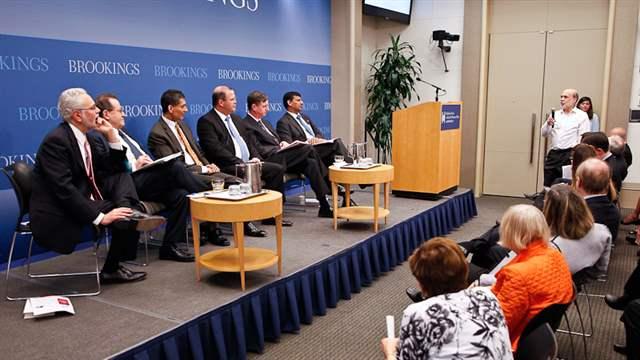Yesterday, the Hutchins Center on Fiscal and Monetary Policy at Brookings hosted Raghuram Rajan, India’s central banker, who discussed emerging markets’ perspective on advanced-economy monetary policies, a subject on which he has been very outspoken lately. Rajan was joined by several other central bankers and Brookings scholars for an insightful conversation about the Fed’s impact on emerging markets.
Watch some highlights from the event below:
David Wessel, director of the Hutchins Center on Fiscal and Monetary Policy and a senior fellow in Economic Studies, introduces Reserve Bank of India Governor Raghuram Rajan.
Raghuram Rajan of the Reserve Bank of India poses his four key policy concerns in central banking and addresses what he calls the key question of what happens when central banking policies are prolonged long beyond repairing markets, and the benefits are much less clear.
Vitor Constancio, vice president of the European Central Bank,
discusses how Rajan’s proposal is missing two aspects: consideration of what would have happened if economies had not pursued these policies after 2009 and negative output gaps in advanced economies.
Charles Evans, president of the Federal Reserve Bank of Chicago, argues that while the American consumer is slowly improving it is just a shadow of its former self and that we all need to pay attention to that when we think about the international implications of policies.
Eswar Prasad, the New Century Chair in International Trade and Economics and a senior fellow in Brookings’ Global Economy and Development program, addresses the different economic realities faced by each panelist.
Former Federal Reserve Chairman and Brookings Distinguished Fellow Ben Bernanke also
joined the conversation from the audience, sharing with Rajan his belief that:
“Your speech just reflects the fact that you are very skeptical of unconventional monetary policies. You say that the rules of the game should prevent policies with ‘large adverse spillovers and questionable domestic benefits.’ If you have a different empirical assessment than I do, that in fact, emerging markets would be better off if they hadn’t been used, then you would have a different view.”

Former Federal Reserve Chairman and Brookings Distinguished Fellow Ben Bernanke addresses Raghuram Rajan
You can access the full event audio and webcast video on the event page, and read more in a post by David Wessel on the Brookings Up Front blog.



Commentary
VIDEO: India’s Rajan Joins Hutchins Center Discussion on Global Monetary Policy
April 11, 2014